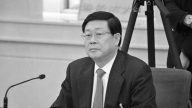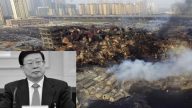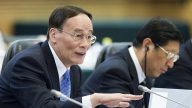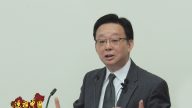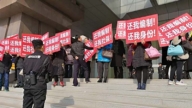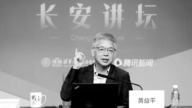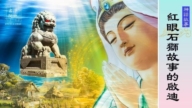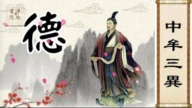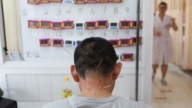【新唐人2011年10月8日讯】100年前,中国大陆一场推翻满清暴政的“武昌起义”活动,成就了辛亥革命的变革。被海峡两岸尊为国父的孙中山先生,当年留下遗言“革命尚未成功,同志仍需努力”,那么,当年中国革命先烈们的民主革命,在百年后的今天完成了吗﹖
台湾正在庆祝“中华民国建国百年”,而中国大陆当局在庆祝辛亥革命百年时,不仅只字不提中华民国,还比以往低调。“革命”在中国竟成了敏感词。
“中国民主运动海外联席会议”等十几个团体,在美国国会大厦也举办了研讨会,多位中国问题专家回顾中国一百年来的历史,并探讨中华民族面临的抉择和未来的出路。
“中国民主运动海外联席会议”主席魏京生表示,今年中共比较紧张,因为现在大部分老百姓认为改革已经没有希望了,只剩下革命了,所以共产党很怕辛亥革命的‘革命’这两字。
中国民主运动海外联席会议主席魏京生:“过去每年不管我们在大陆还是在台湾,纪念辛亥革命好像是一个常规性的活动,两边都搞的热热闹闹的、轰轰烈烈的。回忆那段历史,讲到伟大意义——孙中山先生领导着一批革命志士,一而再再而三的起义,流血牺牲也不怕,最后终于创建了亚洲第一个民主共和国。”
魏京生认为,历史再一次走向了转折点。一百年前滋生辛亥革命的土壤,同样存在今天的中国,民众的革命意识一旦被唤醒,中国就可能发生巨变。
而美国乔治梅森大学客座教授章天亮,也在这场辛亥革命研讨活动中表示,中共当然不太敢纪念辛亥革命,因为中共的贪污比满清政府有过之而无不及。如果纪念辛亥革命,其实是在唤醒民众的革命意识。
美国乔治梅森大学客座教授章天亮:“不光是中东和北非都发生了茉莉花的革命。就包括在80年代末90年代初的时候,苏联解体跟东欧巨变,都有一个非常显着的特点,就是民众普遍的对共产党的唾弃、对独裁者的唾弃,如果这种唾弃不能够在社会上形成一种普遍的共识的话,那个独裁者是不可能被推翻的,民众是不可能为这样的一种理念去走上街头,付出那么多的流血牺牲的。”
“中国冤民大同盟”成员葛丽芳,在会上代表一批被中共强拆而无家可归的大陆民众,控诉中共暴力极权统治,她呼吁美国国会关注中国恶劣的人权状况。
中国冤民大同盟葛丽芳: “反观,作为辛亥革命仅剩果实,在台湾的中华民国政府,其执政理念——天下为公、人民最大,2300万台湾民国国民在宪政民主的保护伞下,过着幸福、和谐、富足的生活,人人有选举国家领导人和监督政府职能部门的权力,人人免除了制度性恐惧,宪政与专政,三民主义和共产主义,孰胜孰劣?一目了然!”
与会的多位专家提到,中国目前贫富不均造成的社会矛盾,已经让众多百姓对现行体制产生了不满和怨恨,用行动进行反抗的人越来越多。他们期待:中国真正拥有民主自由的那一天的到来。
新唐人记者王凯迪、周平、黄容报导。
CCP Keeps Low Profile at the Centennial of the 1911 Chinese Revolution
100 years ago in China, the Wuchang Uprising overthrew
the Qing Dynasty’s tyranny, and laid a basis for achievements
made by the 1911 Chinese Revolution. Sun Yat-sen,
revered as the Father of the Nation by all Chinese,
left these last words, “Revolution is not successful yet,
comrades need to continue to work hard."
Then, so far who has completed the democratic revolution that Chinese martyrs
fought for?
Taiwan is celebrating the 100th anniversary of the founding
of the Republic of China. However, when China’s authorities
celebrate the 1911 Chinese Revolution centennial, not only
is there no mention of the Republic of China, but they also keep the lowest
profile ever. The word “revolution” has even become a sensitive word.
Over a dozen groups including Overseas Chinese
Democracy Coalition (OCDC) held a seminar
in the US Capitol. Reviewing the last 100 years of China,
many experts on Chinese issues discussed the possible
choices and future prospects for the Chinese people.
OCDC President Wei Jingsheng said that this year,
the CCP (Chinese Communist Party) is pretty nervous.
This is because most civilians do not believe in
reform any more, making revolution the only choice.
So that is why the CCP fears the word “revolution” so much.
Wei Jingsheng (OCDC President):“Over the years,
no matter if it’s in mainland China or Taiwan, ceremonies
to commemorate the anniversary of the 1911 Revolution
have became regular and routine, bustling and vigorous.
Recalling that period of history shows its great significance:
Mr. Sun Yat-sen led a group of revolutionaries to initiate
uprisings again and again, fearing no bloodshed and death.
They finally founded the first democratic republic in Asia.”
Wei believes that history once again approaches
a turning point. Today in China, the same soil that
bred the 1911 Revolution still exists. Once the masses’ revolutionary consciousnesses
are awakened, it could trigger a dramatic
change in China.
Zhang Tianliang, a visiting professor at George Mason Univ.,
commented at the seminar. The CCP authorities certainly
dare not commemorate 1911 Revolution in a striking way,
for the CCP’s corruption rather surpasses that of
the Manchu regime.
So if the CCP marks the Revolution, it is just
awakening the masses’ consciousness of revolution.
Zhang Tianliang (Visiting professor, George Mason Univ.) :
“In the Middle East and North Africa,
Jasmine Revolutions have occurred. Back in late the 80s and early 90s,
the Soviet Union disintegrated and Eastern Europe
experienced drastic changes. All these revolutions
have the same significant characteristic. That is,
a common casting aside of the Communist Party
and dictators by civilians. In other words, if such a spurn had not
formed a general consensus among the masses,
the dictator would not have been overthrown, and
it was impossible for civilians to take to the streets and
sacrifice so much for such an ideal. ”
Ge Lifang, member of League of Chinese Victims,
denounced CCP’s totalitarian and violent ruling
at the seminar. On behalf of groups of
homeless Chinese civilians who suffered forced demolitions,
Ge urged the U.S. Congress to concern themselves with
China’s poor human rights situation.
Ge Lifang, (Member of League of Chinese Victims) :
“In contrast, in the only remaining fruit of the 1911 Revolution,
the Republic of China in Taiwan, the governing
philosophy is “all under heaven are equal, the people are
regarded as the most important.”
23 million Taiwanese are leading happy, harmonious
and prosperous lives under constitutional democracy.
Everyone has the right to vote and to supervise
the performance of the government’s functional departments
without any fear. Constitutionalism vs. Dictatorship,
San-min Doctrine vs. Communism, Which is better?
It is clear at a glance!”
Experts attending the seminar indicated that social conflicts
in China caused by the gap between the rich and the poor
has incited the public’s discontent and resentment towards
the current political system. More and more civilians have
expressed their resistance with concrete actions.
What they are expecting is the arrival of the day when
democracy and freedom really come true in China.
NTD reporters Wang Kaidi, Zhou Ping and Huang Rong


